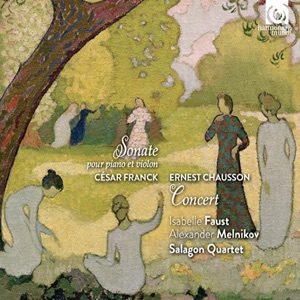“French Chef” and food icon Julia Child had no patience for nonsense. When the idea of ridiculously priced, gourmet salt burst upon the market a few decades ago, her response was typical, and salutary. “Salt is salt,” she declared. So it is with music. These performances are touted as special by virtue of the fact that Isabelle Faust plays on gut strings. Who cares? Anyone who finds that a legitimate selling point is certainly selling something, but it’s not music. What matters isn’t what the strings are made of, but how they’re played. Period.
There’s no question that Faust and her excellent partner, Alexander Melnikov (as well as the Salagon Quartet in the Chausson) seek to find a new approach to this music, and in the Chausson it works beautifully for the most part. The Franck is another story. Faust seems determined to avoid the hyper-romantic, throbbingly passionate approach to the piece that we have come to expect. Fair enough. It’s a valid concept, typified by extremes of dynamics, minimal vibrato, selectively graded but powerful climaxes, and an unusually intimate rapport between the violin and the piano.
The problem is that she hasn’t the technique to carry it off, quite. As a partner Melnikov couldn’t be more sensitive, and the engineering captures the two players in perfect balance. And yet, there are moments in the opening movement where Faust disappears almost completely, and this destroys the atmosphere she has taken such pains to create. Like so many players today, she has trouble sustaining a tone at lower dynamics: it flutters in and out of existence like a bad imitation of a poorly recorded 78 rpm disc. The finale stubbornly refuses to sing, the music’s freshness and innocence turning whiny and shrill.
Chausson’s Concert is another matter entirely. Certainly, there are some of the same mannerisms in softer passages, especially in the slow movement, but the presence of the Salagon Quartet provides a sort of sonic frame that supports Faust’s desire for expressive rumination. She doesn’t play the work like a violin concerto–which, arguably, it isn’t–but as true chamber music, keeping textures light, open, and transparent. The result projects a welcome degree of charm and nuance, all too rare in a piece that often sounds murky and thick despite the limited forces at hand.
Faust, Melnikov, and team deserve credit for offering to rethink the usual approach to this music. They take risks, for sure, but ideas come cheap. The only thing that really matters is how well the players pull them off. Is it better to have a dull or even perverse conception fabulously performed, or a technically defective but brilliant or provocative interpretation? The answer is: neither. Listeners should not have to settle, and we should demand nothing less than both rock-solid technical prowess as well as interpretive depth and insight. On this score Faust, the star of the show, fails to deliver the total package.
































